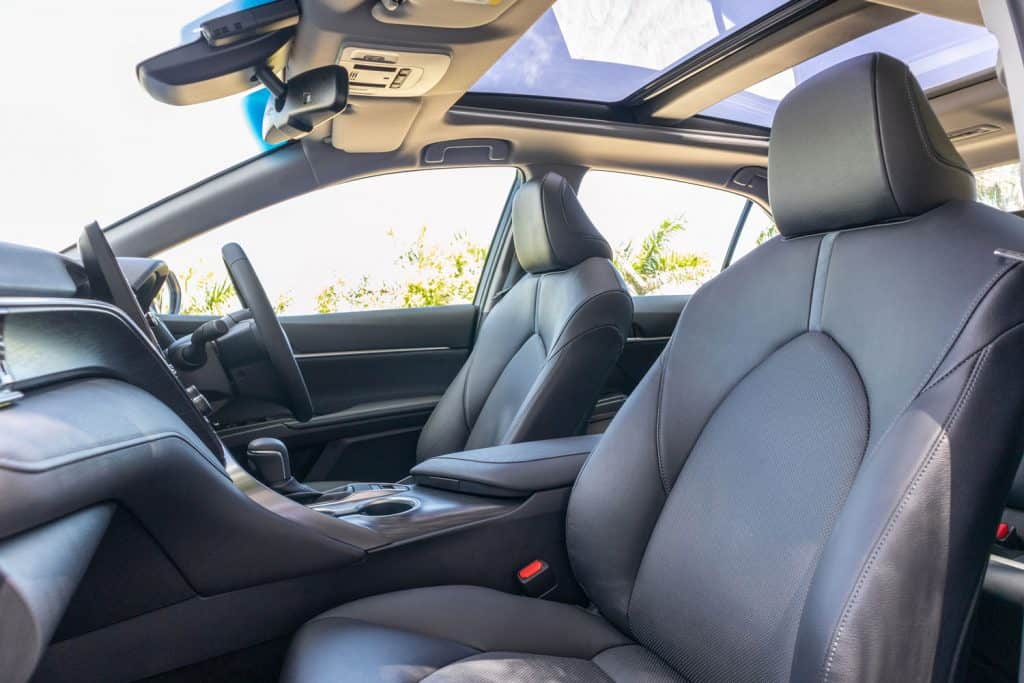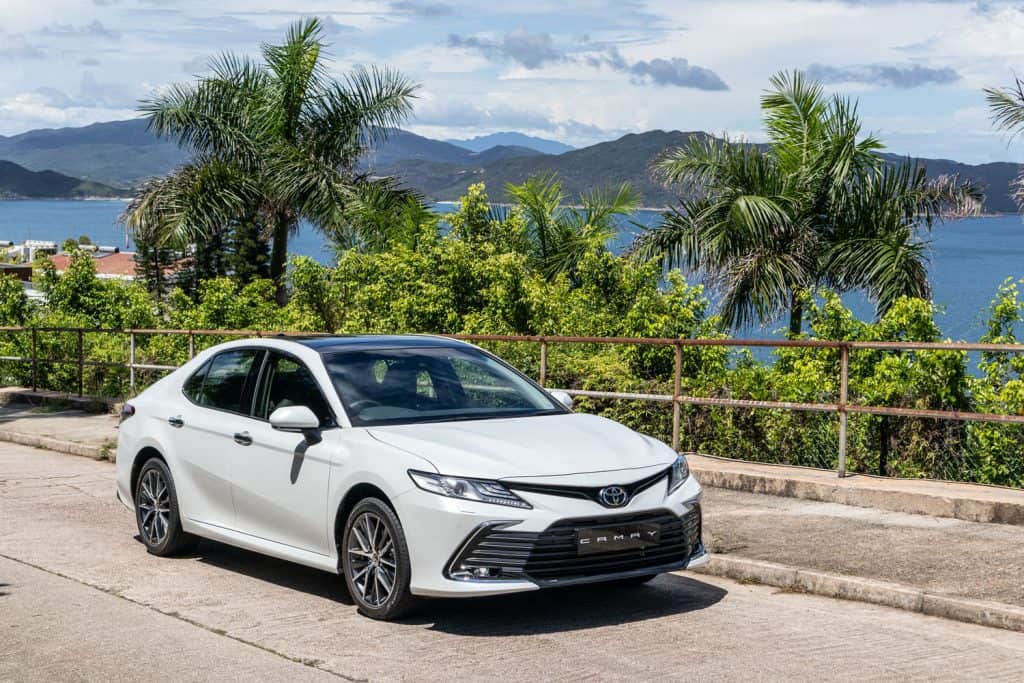The Toyota Camry is a household name for full-size sedans in the United States. It is so much a staple that Toyota has improved its Camry line to include more premium models. Among these models are a trendy hybrid and even a Camry with a V6 performance engine. Those features are obvious, but it's a little more challenging to find information about the wheel drive systems of the Camry. Does the Camry come in all-wheel-drive? We researched all of Toyota's spec sheets and marketing information to provide you with an answer here in this post.
The standard wheel drive system of the 2021 Toyota Camry is front-wheel-drive. However, you have the option to upgrade the Camry to an all-wheel-drive system. You can upgrade the Camry's two available grades, the LE and the SE, to the all-wheel-drive system. AWD is not available on the Hybrid models of either of the LE or SE trims.
So, the Camry does have the option to upgrade to an all-wheel-drive version for each of its standard trims. But there is more to that all-wheel-drive system than meets the eye. Continue reading this post to find out more about the nature of the Toyota all-wheel-drive drivetrain. We will also discuss how the Toyota Camry handles poor weather conditions like snow and rain.

The All-Wheel-Drive Toyota Camry
The standard wheel drive system on the 2021 Toyota Camry is front-wheel-drive. There are two grades of the 2021 Camry available in the US market - the LE and the SE. The SE is the more premium version of the Camry, but there are only a few differences between the two. For example, the SE has an upgraded suspension system, dual exhaust tips, better climate control, and a few cosmetic differences. Both the LE and the SE have a spec option that changes the standard FWD to the Toyota all-wheel-drive system.
The standard front-wheel-drive drivetrain is powered by a 2.5 liter 4 cylinder engine that puts out 203 horsepower for each of these trims. The all-wheel-drive version has the same engine but sacrifices some horsepower.
One of the only downsides to the Camry offerings is that no model has both the AWD and the performance V6. Additionally, neither of the LE or SE hybrid trims is available with AWD.
Is AWD More Expensive to Maintain?
A potential reason that an AWD is more expensive than other drivetrain systems is that the systems themselves are more complex. The more parts you have in a system, the more can potentially go wrong, break, and need repair. Some of these components even require routine maintenance to ensure they work properly.
Another more present reason that AWD is more expensive to maintain than FWD or RWD vehicles is because of the tires. When you have an FWD or RWD vehicle, you can buy tires in sets of two. Then you can place the two new tires on the back axle, leaving the two older tires at the front. With an AWD vehicle, you have to change all four tires at the same time.
This means you'll always have the cost of purchasing four tires each time, even if only one is worn or damaged. This is necessary because the tires all work together in the AWD system to ensure the vehicle has traction. So, you can't have some tires with significantly worse tread than the others.
Does AWD Use More Gas?

Vehicles with all-wheel-drive systems typically use more fuel than vehicles with front-wheel-drive systems. There are two reasons that AWDs use a little bit of extra fuel; weight and power distribution. First, all-wheel-drive systems are heavier than their front-wheel-drive or even rear-wheel-drive counterparts. This is simply because they have more components that have to reach four wheels instead of just two.
Second, an AWD vehicle uses more fuel because it has to power four wheels instead of two. The type of wheel drive system most guilty of this greater use of power is the 4x4 drivetrain. Unlike an AWD system that distributes power among the four wheels only when needed due to traction changes, the 4x4 spreads power evenly all the time. Fortunately, the AWD is responsive and therefore ends up using less fuel than the 4x4.
All of that being said, you shouldn't let fuel economy keep you from choosing a vehicle with all-wheel drive. The gas usage differences between the FWD and AWD aren't too huge. For example, the Toyota Camry LE with FWD has a combined city/highway gas mileage of 32 miles per gallon. On the other hand, the same Camry LE with AWD gets 29 miles per gallon combined city/highway. These are dwarfed by the fuel economy on the Hybrid Camry - 46 MPG combined city/highway.
Does AWD Help in the Rain?
According to the Camry features section of the Toyota website, the Camry's all-wheel-drive system is great in the rain. Because the AWD on the Camry is a smart wheel drive system, it responds to weather conditions in real-time. For example, if the front wheel begins to slip and lose traction, the Camry responds by moving up to 50% of torque to the rear wheels. This responsiveness helps to keep the car in control at all times and significantly improves handling.
Is the Toyota Camry Good in the Snow?
More specifically, how does the standard FWD Camry do in snow versus the AWD version? It's common knowledge that FWD vehicles perform better in snowy conditions than RWD vehicles do. The pulling action of the FWD creates less fishtailing and, therefore, fewer problems. So the standard FWD Camry will handle fine in the snow, but you'll have to exercise caution. With the AWD version, you can have a little more confidence in the vehicle's ability to perform on slick or icy roads.
If you want to see the Toyota Camry in action on a snow-covered course, then take a look at this video from Edmunds.
What Other Toyota Vehicles have AWD?
If you aren't entirely sold on the Camry as your next vehicle, but all-wheel-drive is a must-have, Toyota has a few other options. The automaker even has a webpage dedicated to showcasing which models from their line have the opportunity to get all-wheel-drive. If you are set on a sedan, then the Avalon or Prius may be for you. Here is a list of all Toyota's AWD vehicles:
- Toyota Prius
- Toyota Sienna
- Toyota Tacoma
- Toyota Tundra
- Toyota RAV4
- Toyota Highlander
- Toyota 4Runner
- Toyota Sequoia
- Toyota Land Cruiser
- Toyota Avalon
- Toyota Venza
Will the 2022 Toyota Camry have AWD?
According to Edmunds, Toyota will continue its trend to include an AWD option on its 2022 Camry. The Camry is one of the only mid-size sedans that consistently offer this option, which sets them apart. It seems they have no plan of changing that any time soon.
In Closing

If you are concerned about hazardous roadways during rain or snow, an AWD vehicle will put your mind at ease. Any person shopping for an AWD sedan in 2021 shouldn't purchase one without considering the Toyota Camry. You will have to sacrifice a little bit of fuel economy to get the AWD feature. But the safety advantages outweigh the disadvantages of the loss in fuel efficiency and maintenance costs, especially if you live in a snowy or rainy climate. On the other hand, the FWD version should be all you need in a drivetrain if you live in a warm and dry climate.
If you find the information in this post helpful, please check out a few of our others:
